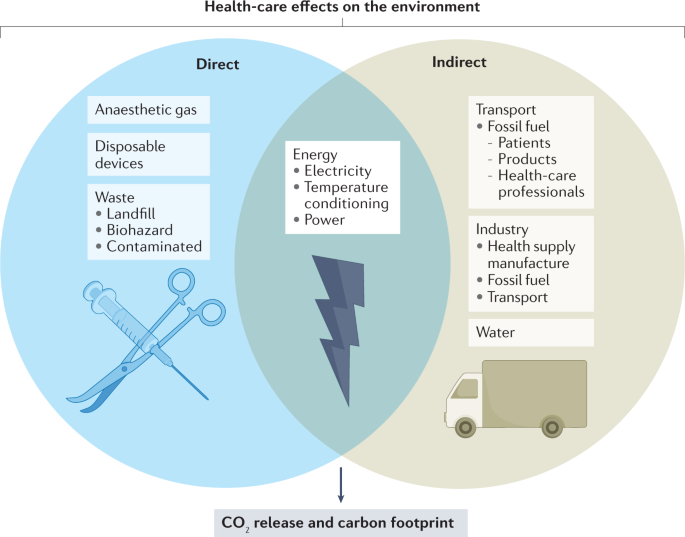Miguel F Cunha & Gianluca Pellino
“The things of nature do not really belong to us,
we should leave them to our children as we have received them”
(O. Wilde, 1936, Oscar Wilde Discovers America [1882] by Lloyd Lewis & Henry Justin Smith, Book 4: Eastward, Southward, Northward, Chapter 2: Adds a New Horror To Death, Quote Page 350, Harcourt, Brace and Company, New York.)
- The idea for an article on sustainability in surgery
The European Society of Coloproctology (ESCP) annually promotes an annual campaign, usually on cutting-edge topics. As active members of ESCP, the authors usually play a dynamic role in these yearly campaigns. In 2021 the subject of the campaign was “Sustainability in Surgery”1. This initiative was divided into three different approaches: 1) raising awareness on the subject by sharing striking visual data using “flashcards”2; performing interviews with leaders in the environmental sustainability field3–6; and finally, the release of a survey study (the ECOS-Surgery [ESCP Capturing Opinions on Sustainable Surgery]), which aimed to explore surgeons’ attitudes towards sustainable surgery and opportunities to drive sustainability in coloproctology7. All the information collected during this campaign showed the utmost importance of this subject and, importantly, displayed the interviewees’ desire to go deeper into this problem.
As surgeons working in the gastrointestinal field, facing the impact of surgical practice on the environment was initially of great surprise. We felt we should be doing something to tackle this! During this time, Miguel Cunha (one of the authors) was planning his Doctor of Philosophy (PhD) in colorectal cancer epigenetics. The in-depth study performed to cover the campaign content and the distressing data on the impact of healthcare, surgery in particular, on global warming and health, led him to change the focus of his PhD to Sustainability in Surgery. His professors fully supported him, namely Prof. Gianluca Pellino and Prof. Pedro Castelo-Branco. Miguel is currently in the second year of his PhD in Sustainability in surgery, and the Ethos is to reduce the environmental impact of surgery while asserting the quality and outcomes.
The manuscript “Environmental effects of surgical procedures and strategies for sustainable surgery”8 is the kicking-off result of this PhD project.
- Sustainability does matter
We all acknowledge that we are facing an environmental crisis. Global warming is a significant problem recognised by governments and companies9. However, most of the time, economic choices are still the priority and appear as barriers to change10. Some adjustments are indeed being made. As we notice, for example, that there is changing policy on motor oil vehicles while electric ones are being promoted, or as we admit, recycling is being advocated on a household level11.
Nevertheless, concerning health, environmental harm seems not to be a priority. However, data on the healthcare sector's environmental impact is alarming. Globally, healthcare is responsible for 8-10% of the Greenhouse gas emissions12. Operating theatres, in particular, are three to six times more energy intensive than the rest of the hospital13 .

As health professionals, we look at the health of our patients as our main outcome, but global warming is threatening our patients’ health (e.g., exacerbation of cardiovascular and respiratory diseases; an ideal setting for infection spreading; air pollutants increase gastro-oesophageal reflux disease; higher risk of low birth weight and preterm labour with higher temperatures; higher risk of cardiac arrest and emergency admissions for stroke and asthma on days of high air pollution8) The ultimate objective is to achieve the same results for our patients in the most environmentally sustainable way. One should be able to improve patients’ outcomes while reducing the impact of healthcare on global warming, thus promoting the health of current and future generations.
- A future look
One should be concerned about the future as this is not a new problem, and little has been made so far. Research on this topic mounts back at least 10 years ago when Kagoma et al14. focused on the waste produced by operating theatres. Kagoma et al. suggested using the 5 R’s rule (Reduce, Reuse, Recycle, Rethink and Research) to reduce waste’s environmental footprint. From our perspective, this rule can still be applied to more than just waste. In our manuscript, we aimed to provide an updated looked into each “R” and how one can apply it to daily practice). However, an additional “R” rule should be considered: Re-education8. Education towards a sustainable healthcare practice would create awareness on this subject, gather groups interested in working on this matter and ultimately change mentalities. Educated health professionals will consistently apply the changes needed to achieve an environmentally sustainable practice while striving for the patients’ best clinical outcomes.

To achieve that goal, it is important that the broader society recognises the healthcare carbon footprint as a problem. “Re-education” involves implementing these important concepts and priorities in the education path at schools and universities. As healthcare professionals, we are responsible for providing the patients, the community, and the entities, with high-quality data that can help to identify sustainable and safe healthcare options. Research on the environmental effects of medical and surgical practice will hence be instrumental; this should involve patients, entities and companies in so that a transition towards a greener approach becomes reality in a near future.
References
ESCP Goes Green | European Society of Coloproctology. Available at: https://www.escp.eu.com/news/2277-escp-goes-green. (Accessed: 3rd March 2022)
- (14) Young ESCP on Twitter: ‘🏥 Healthcare facts🏥 🗣 Are you aware that: 🤔 #sustainablesurgery 👇 @AntoninoSpin @MichelAdamina @ZimNl @PeterCh12345 @ESCP_studies @aecirujanos @ASCRS_1 @SAGES_Updates @SocSurgOnc @ColorectalDis @BJSurgery @BjsOpen @young_bjs @ACPGBI @Northern_ACPGBI @ESSOnews @SWexner https://t.co/GKIvyVcBew’ / Twitter. Available at: https://twitter.com/YouESCP/status/1412457444253515780?s=20&t=vTYG0NYb5L4e4YwnhtzYmA. (Accessed: 1st February 2023)
- #SustainableSurgery - video with Gabriela Möslein | European Society of Coloproctology. Available at: https://www.escp.eu.com/news/2290-sustainablesurgery-video-with-gabriela-moeslein. (Accessed: 1st February 2023)
- #SustainableSurgery - interview with Cleo Kenington | European Society of Coloproctology. Available at: https://www.escp.eu.com/news/2286-sustainablesurgery-interview-with-cleo-kenington. (Accessed: 1st February 2023)
- #SustainableSurgery - video with Andrea Pietrabissa | European Society of Coloproctology. Available at: https://www.escp.eu.com/news/2282-sustainablesurgery-video-with-andrea-pietrabissa. (Accessed: 1st February 2023)
- #SustainableSurgery - interview with Victoria Pegna | European Society of Coloproctology. Available at: https://www.escp.eu.com/news/2279-sustainablesurgery-interview-with-victoria-pegna. (Accessed: 1st February 2023)
- Garoufalia, Z. et al. The European Society of Coloproctology Collecting Opinions on Sustainable Surgery Study. Dis. Colon Rectum 65, 1297–1300 (2022).
- Cunha, M. F. & Pellino, G. Environmental effects of surgical procedures and strategies for sustainable surgery. Nat. Rev. Gastroenterol. Hepatol. (2022). doi:10.1038/S41575-022-00716-5 https://www.nature.com/articles/s41575-022-00716-5
- Sarr, M. D. At COP 27, support poorest for climate loss and damage. Nature 611, 9 (2022).
- 3 Biggest Barriers Holding Cities Back on Climate Change. Available at: https://nextcity.org/urbanist-news/cities-acting-against-climate-change. (Accessed: 19th September 2022)
- Brethauer, S. & Hans-Peter Studer, M. Towards Net Zero Greenhouse Gas Emissions in the Energy and Chemical Sectors in Switzerland and Beyond - A Review. Chimia (Aarau). 75, 788–799 (2021).
- Rizan, C. et al. The Carbon Footprint of Surgical Operations: A Systematic Review. Ann. Surg. 272, 986–995 (2020).
- MacNeill, A. J., Lillywhite, R. & Brown, C. J. The impact of surgery on global climate: a carbon footprinting study of operating theatres in three health systems. Lancet Planet. Heal. 1, e360–e367 (2017).
- Kagoma, Y., Stall, N., Rubinstein, E. & Naudie, D. People, planet and profits: The case for greening operating rooms. CMAJ 184, 1905–1911 (2012).
Academic and Social Media Profiles
Miguel F Cunha
Twitter @MiguelCunhaSurg
LinkedIn https://www.linkedin.com/in/miguel-cunha-956a62a9/
Instagram @miguelcunha86
ORCID 0000-0002-7353-2425
Gianluca Pellino
Twitter @GianlucaPellino
LinkedIn https://www.linkedin.com/in/gianluca-pellino-b55b9641/
Instagram @gipe84
ORCID 0000-0002-8322-6421







Please sign in or register for FREE
If you are a registered user on Research Communities by Springer Nature, please sign in